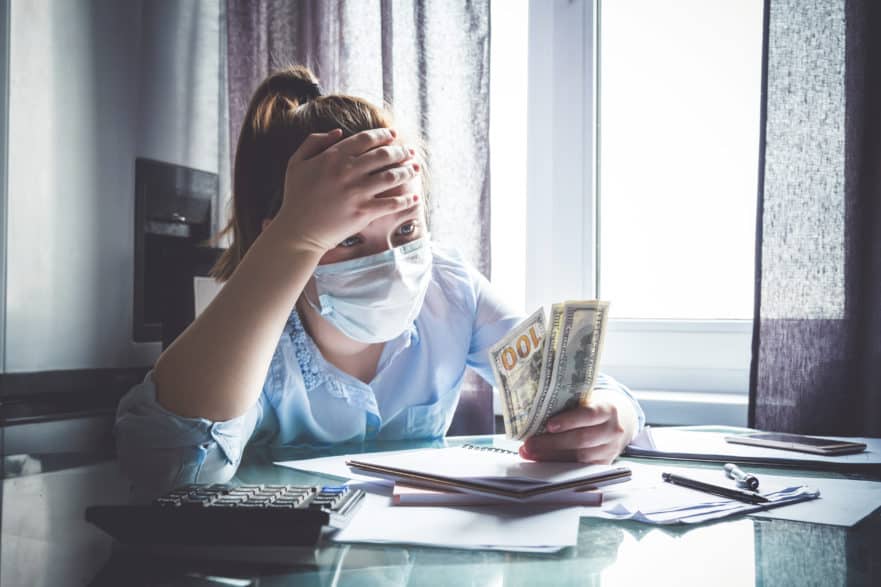If you’ve found yourself in financial hardship due to the Coronavirus pandemic, you’re definitely not alone. In the six weeks since COVID-19 began prompting shutdowns across the U.S., a record 30 million people have lost their jobs. That number doesn’t include the millions of other self-employed individuals or “gig workers” who have seen at least partial drops in income due to this health crisis. Here in New York, where so many people rely on the hospitality and entertainment industries for income, unemployment has jumped by at least 360 percent.
Even in “normal” conditions, 72% of adults report feeling stressed about money. Financial stress is the leading cause of stress in the United States. With the added fears of getting the disease itself, coupled with forced layoffs and near-total shutdowns of complete cities and industries, it’s little wonder that most Americans are struggling with their mental health in some way right now.
Although your loss of income may be out of your control, there are steps you can take to protect your mental health and boost your well-being during this critical time. Let’s talk about some ways the pandemic-induced financial hardship might be affecting you mentally, and what you can do to fight back.
Possible Effects of Financial Stress on Your Mental Health
The uncertainty of a drop in income, not to mention the struggle to pay bills or buy food, can create a wide range of mental health symptoms. Financial stress can lead to:
- Chronic Stress. Your financial situation might plunge you in a chronic state of stress where you might constantly worry about money. Chronic stress interferes with the ability to live a normal life.
- Impaired Physical Health. Body and mind are connected. Chronic financial stress causes wear and tear on your body. Chronic financial stress can also cause diseases including heart issues, hypertension, shortness of breath, weight gain, loss of sleep and many others.
- Anxiety and panic attacks. The uncertainty of the future or the sense of dread may cause both latent anxiety and acute bouts of panic.
- Depression. The sense of helplessness from financial woes can create feelings of pessimism, worthlessness and persistent sadness.
- Unhealthy Coping Behaviors. You might seek to avoid the unpleasant feelings of anxiety associated with financial stress by overeating and overindulging in alcohol and other recreational drugs. If you are a recovering alcoholic or substance abuser, the added financial pressure may serve as a trigger to relapse.
- Post Traumatic Stress Syndrome (PTSD). The pandemic and its financial impact came as shock for most of us. When the Covid-19 pandemic started affecting you, your fight-or-flight response might have kicked in to cope with the immediate situation, but your brain could not make sense of it all at the time. This might lead to experiencing post-traumatic stress long after the financial danger is gone.
- Delayed Healthcare. Under financial stress, people tend to cut corners and postpone their healthcare needs. As the health need continue going unaddressed, it often becomes bigger and more difficult to resolve.
Looking For Therapy?
Start Healing Today.
212-960-8626
Alleviating Financial Stress
Understanding the very real threats that financial stress may pose to your mental health, what steps can you take to protect yourself mentally and emotionally until things start to improve?
Contextualize the problem and realize that nothing is permanent. You may need to remind yourself that your financial issues caused by COVID-19 are temporary, just as the pandemic and just as life itself. It’s all impermanent. This situation is not how your life will be from now on; it is a single page in your story. Being aware that negative and positive occurrences are both impermanent is crucial for appreciating life for what it is. Things seem to never stay the same for very long, do they? Today’s financial stress is unlikely to be what you’ll worry about this time next year. In other words, this too shall pass.
Let go of what you cannot control. No matter how many times you do the math, the numbers might not add up for a while. Accepting the reality as it is may reduce the anxiety or the pressure to “fix” what is outside of your control. You can only do the best you can. Nothing more. Feeling some financial stress might be helpful to spark you into action. But careful not to let the financial stress control you. There is a tipping point where more stress will make you perform worse, not better. Just do the best you can. Anything outside of that is not worth worrying about.
Cultivate peace and happiness within. Facing financial hardship does not mean you’ve stopped breathing. In difficult times, people are often stressed because they lost, or fear losing, material things they are attached to. However, genuine happiness and peace comes from within. Even in the midst of financial woes, you can feel peace and happy. You can cultivate those states of being through meditation, introspection and journaling.
Practice mindfulness and self-care. Mindfulness meditation and anxiety-reducing exercises can help curb acute feelings of stress and fear. So can simple things like hot baths, healthy food and exercise.
Talk to someone. Isolation can distort our sense of reality and make temporary problems seem insurmountable. If you’re struggling emotionally, talk to a therapist. Online therapy is widely available these days. It is a great way to work on yourself and address your feelings of financial stress in a productive manner.
If you’re struggling mentally due to a COVID-19 related job loss or financial difficulty, don’t let finances stop you from getting the help you need. Manhattan Mental Health Counseling takes most insurances, and charge reasonable self-pay fees for therapy. Contact us to learn more.

